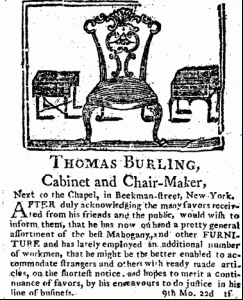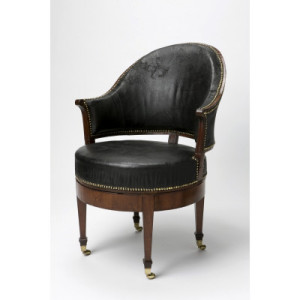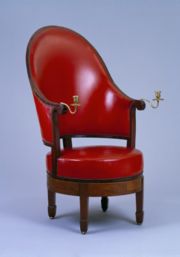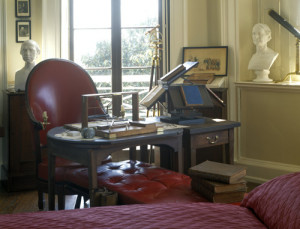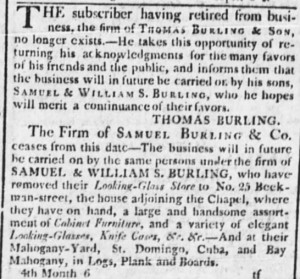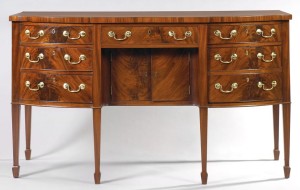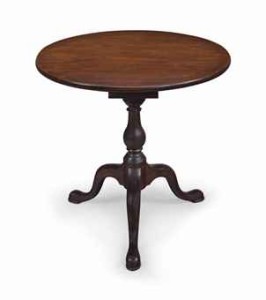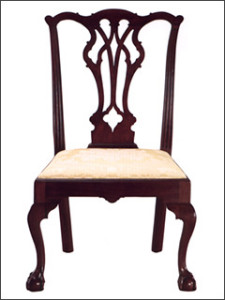Thomas Burling (1746-1831) was the son of Ebenezer Burling and Mary Lawrence. He was the first cousin of Effingham Embree the clockmaker, and may have made cabinets for the clocks. He was my wife’s fifth great grand uncle. He married Susanna Carter in 1767 and had numerous children.
He trained as a cabinetmaker under Samuel Prince.
Thomas quickly became known as one of the finest cabinet makers in North America. When the capital of the new United States was located in New York, Congress leased for George Washington the house at 3 Cherry Street, and furnished it, mostly from Thomas’s shop:
With the exception of the upholsterer’s charges, the greatest sum for furnishings was paid to Thomas Burling for “Mahogany Furniture,” which contributed to what Martha Washington called a “handsomely furnished house.” In total, Congress spent eight thousand dollars preparing the executive residence for the Washington family.
George Washington commissioned a special piece of furniture, an “uncommon chair,” from Thomas Burling.
The Burling chair at Mt. Vernon
On April 17, 1790, Washington paid New York cabinetmaker Thomas Burling £7 for this ingeniously-engineered “Uncommon Chair.” It combines the sleek, contemporary design of a French bergère en gondole (or barrel-back upholstered armchair) with a unique swivel mechanism that allows the circular seat to rotate on four bone rollers. Washington must have found the chair to be ergonomically pleasing, as he used it throughout his presidency and for the remainder of his life. Following his return to Mount Vernon in March 1797, he placed it in his study.
Thomas Jefferson liked it, and in 1790, on the same trip he pursed toothbrushes from Effingham Lawrence the druggist, he also had Thomas Burling make a similar chair.
The Burling chair made for Jefferson
The Burling chair in situ at Monticello
While serving as secretary of state in New York in 1790, Jefferson purchased a good deal of furniture from local cabinetmakers, particularly Thomas Burling, who had a shop on Beekman Street. In his Memorandum Book, Jefferson carefully recorded two payments totaling £143 to Burling in July and August 1790 but did not identify his purchases. Among other articles, Jefferson evidently acquired a sofa and a revolving chair.
Jefferson’s chair was mocked by the Federalists:
Although Washington eluded the enmity of the Federalist critic William Loughton Smith, Jefferson did not escape ridicule for his politics and his chair. Smith wrote, “Who has not heard from the Secretary of the praises of his wonderful Whirlgig Chair, which had the miraculous quality of allowing the person seated in it to turn his head without moving his tail?”
Burling retired in April 1802and turned his business over to his sons Samuel and William, but his furniture still survives and is prized in the antique market.
